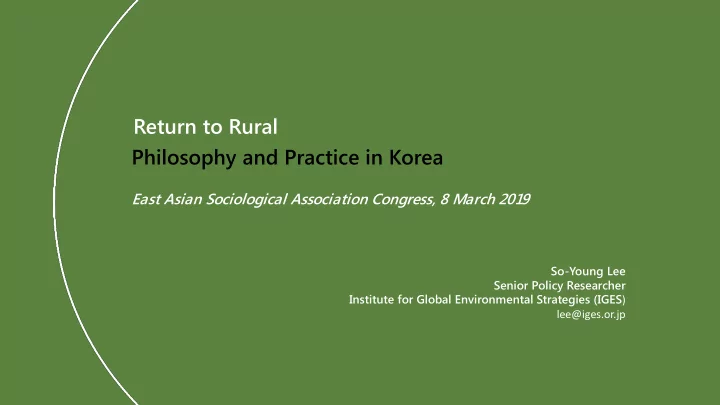

Return to Rural Philosophy and Practice in Korea East Asian Sociological Association Congress, 8 March 2019 So-Young Lee Senior Policy Researcher Institute for Global Environmental Strategies (IGES ) lee@iges.or.jp
Return to Rural movement operates on the underlying premise that the current development centred society should recognise the urgent need for radical shift. Philosophy Green Political Thought in the West Korean Lift Thought 生命思想 / 哲学 Practice Hansalim Manifesto & Co-op Guinong Movement 歸農運動 Indramang Community Explore the functions of Return to Rural implementation in Korea and its correspondence to, and limitations in the face of, wider social change. 2 2
Green Political Thought / Ecological Concerns in the West Requires the radical transformation of the existing anthropocentric and dichotomous worldview to ecological ones i.e. interconnected humans and nature that is influenced by the Eastern philosophy; pictures decentralised, small-scale, self-reliant regions and Deep Ecology vs. 1980s ~ communities; emphasises re-inhabitation; focuses on the need for individuals to change Social Ecology attitudes, values and lifestyles. vs. Places the struggle in a political and a historical context and seeks to fundamental transformation of the current society in all domination– i.e. by the state as a result of the development of bureaucratic rationality and by the capitalists those subdued both workers and nature– through ‘direct action’. R. Bahro (Germany) 1970s Alongside the pessimistic post-industrial visions of counter-cultural theory, the ideas of A. Gorz (France) ecological utopianism was developed as an alternative paradigm for achieving the betterment of society and nature. W. Morris (England) 19 th c. Morris’s romantically inspired social and political vision possessed the characteristics of the ecological rural villages, those of community, harmony with nature, and creativity in work. P . Kropotkin (Russia) “decentralised production, blueprints for the design of agricultural and urban communities on a human scale, that promised a way of reversing all the customary divides of industrial society: urban and rural, mental and manual…” 3 3
Green Political Thought / Ecological Concerns in Korea Deepen further and published in Hansalim Manifesto, 1989 based on Dong-hak. The Manifesto considers industrialism and modernity, as twin components of the dominant culture, coerce all Lift Thought 1980s ~ living-beings into a death-like state by alienating them from the nature wherein they should 生命思想 / 哲学 dwell. To overcome, it suggests a great transformation of moral, spiritual, and ethical consciousness as well as of the material system. Composed of the Korean people’s Confucianism–respecting Sky/Heaven( 天 ); their Buddhism– 19 th c. being present; their Daoism–caring for other beings and emphasised Hanwulnim ( 天主 ) , the Donghak creator of everything and a true being dwells within everything in the universe. 侍天主 : should 東學 realise Hanwulim in ourselves to attain; 事人如天 expand to treat others as Hanwulnim : 敬物 incl. things–‘one bowl of rice.’ Progressive and liberating teaching became the basis of the 東學農民運動 / 革命 in 1894. Attaches importance to the life of each individuals and dependence of each members. Ancient Daoism 道家 Each interdependent with all for survival, sustenance, and fulfilment. The metaphysical implications of the sense of interconnectedness are caught in the jewelled Buddhism Indra-net, where each jewel reflects all the others in the universe in the Avatamska Sutra ( 華嚴經 ). In the Indra-net, “to become fully human is to accept being qualitatively different and yet the same as the rest of planetary life; to accept full responsibility while remaining unreservedly at one with nature”–anthropocosmic worldview. 4 4
Hansalim Manifesto & Co-ops Han = great, one, whole Salim = domestic work & revival of life → ‘Save all living things’ When organic agriculture was unfamiliar to Korea, it started direct trade between organic farmers and consumers as both are the owner of the cooperative. As of 2016, 350 thousand households consumer members, 90 of producer’s community, 2 thousand of farming producer members in 20 regions. 5 5
Guinong Movement ( 歸農運動 ) • Result of the whole story of the long-standing peasant movement. • Since the 1950s, pioneering nature-friendly farmers had stood against the modernisation of the agricultural sector that poisoned both farmers and products, and destroyed the quality of the soil and the ecosystem as well; yet treated as ‘anti-government’/ ‘Red’. • Social, political, and economic insecurity that resulted from Korea’s crisis in 1997 directly encouraged the growth of Guinong Movement. Indra-mang Life Community Founded by the head monk of the Silsang Buddhist Temple ( 實相寺 ) and the head of • National Guinong Movement Headquarters ( 全國歸農運動本部 ) in 1998 • Begun on the basis of Buddhist philosophy but not limited Aimed ecologically friendly local community where all incl. monks, activists, locals, and • nature live in harmony. 6 6
Indramang Life Community Guinong School Compost toilet View of Silsang Temple The Farm Dobub, head monk, and Life Peace Pilgrimage Working together
Small School Nursery in aging rural village Ecotourism with Locals
One bowl of rice Working together Local Products Compost Toilet Urban farmers Dock weeding
MESSAGES ● Dobub’s lesson and Morris’s News for Nowhere envision the Return to Rural implementations become the majority and that could deliver the difference between urban and rural less prominent. ● Attempts are certainly functioning as a resting place from the mainstream world and as a place which offers motives to change the world– focus on the transformation of life-world; then, expect to bear a potential for changing the wider society. ● “If others can see it as I have seen it, then it may be called a vision rather than a dream“ (W. Morris 1890). Ref. So-Young Lee (2012) “Reconsidering Morris’s Ecotopia through Current Ecovillage Implementations”, Korean Journal of Sociology 46(6): 55-74. _______________ (2008) “Korean Environmental Thought and Practice”, Environmental Ethics 30(2): 115-134. 10 10
Recommend
More recommend